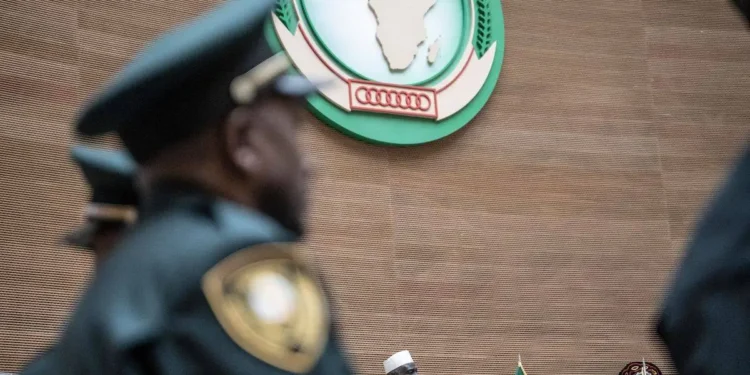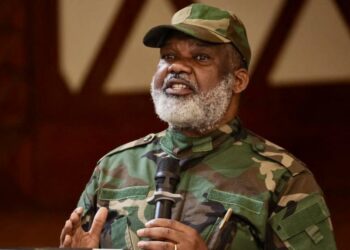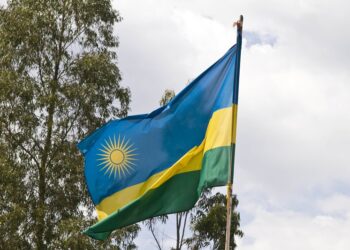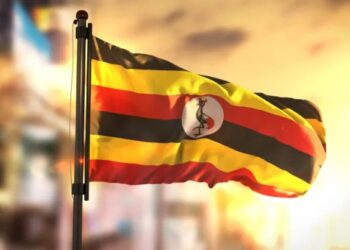By Mustafa Afandy
Sudanese writer and Researcher
Since April 2023, Sudan has been engulfed in a raging war between the Sudan Armed Forces (SAF) and the paramilitary Rapid Support Forces (RSF). To resuscitate the ostensibly dying stability hopes, numerous mediation proposals were placed on the table, ranging from regional, international, and multi-level initiatives. As the leading political body on the African continent, the African Union (AU) was expected to play a central role in facilitating a resolution to the ongoing conflict. This article gives a brief and selective account of how the African Union approached the current war in Sudan. Certain aspects of AU’s historical background, institutional measures, and non-formal dynamics will be utilized in analyzing its response to the current Sudanese conflict.
African Union and the ongoing war in Sudan
Between December 2018 and June 2019, a popular uprising in Sudan set in motion a sequence of events that eventually led to the overthrow of Omar El-Bashir’s longstanding dictatorship at the hands of the military. Shortly afterwards, Sudan was suspended from all African Union (AU) activities. This move was taken to demonstrate the AU’s unwavering support for the establishment of a civilian-led government, countering the military’s inclination to reproduce another dictatorship. However, following the formation of a transitional government combining the civilian coalition “Forces for Freedom and Change” (FFC) and a military council in September 2019, the military staged a coup d’état in October 2021, relieving itself of the burden of civilian rivals. General Abdulfattah Al-Burhan, the head of Sudan’s military, presided over the post-coup Sovereign Council and appointed the RSF commander Mohammed Hamdan Dagalo (Hemedti) as his deputy.
It took less than two years for the delayed collision between the Sudanese Armed Forces and the RSF to erupt on April 15, 2023. In the background of the violence outbreak was the RSF’s rapprochement with the FFC, aspiring to secure greater independence from the Army. The latter, on the other hand, became increasingly aware—albeit belatedly—of the RSF’s ambition for authority, which conflicted with its own aspiration to strengthen its de facto grip on the country.
In response to this devastating escalation, the African Union’s Peace and Security Council (PSC) held an exceptional meeting on May 27, 2023, condemning the warring factions’ use of violence and calling for an immediate ceasefire in Sudan. The PSC urged the conflicting factions, Sudanese stakeholders, and international community to adopt the “AU’s Roadmap for Resolution of the Conflict,” which consisted of six elements:
i) the establishment of a coordination mechanism to ensure all efforts by the regional and global actors are harmonized and impactful;
ii) an immediate, permanent, inclusive, and comprehensive cessation of hostilities;
iii) effective humanitarian response;
iv) protection of civilians and civil infrastructure;
v) Strategic role of neighboring states and the region; and
vi) resumption of a credible and inclusive political transition process that takes into account the contributory role of all Sudanese political and social actors, as well as the signatories to the Juba Peace Agreement, towards a democratic civilian-led government.
The roadmap seemed quite comprehensive and promising, but the challenges on the ground made its attainment elusive. The AU’s contribution to ending the Sudanese war has proven ineffective so far. It has failed to influence the decisions of warring factions towards ending the war or to merely facilitate a successful ceasefire. In his assessment of the AU’s early engagement with the Sudan’s conflict, Tafi Mhaka labeled Africa’s leading political body as “absent” from the Sudanese scene. According to him, the AU failed to assume a leading role when the Saudi-US-facilitated talks began in Jeddah on May 6, 2023. Nor did it succeed in delivering any comprehensive plan to aid millions of Sudanese civilians displaced by the war.
Of course, much can be said about the obstacles facing not just the African Union but all efforts aimed at resolving the Sudanese conflict. Factors such as the complexity of the conflict’s sociohistorical background, the rapid and wide-ranging consequences of the war, foreign intervention, and the lack of genuine desire for reconciliation from both the RSF and SAF have undoubtedly hindered resolution attempts. Some of these factors might indeed go beyond the UA’s ability to influence. Yet one must question this very inability—not to pinpoint a failure or criticize the African Union, but to recognize the deeper challenges confronting Africa’s leading body and hindering its attempts to alter disastrous reality on the ground. This goal is only achievable by articulating the current war in Sudan to its larger African context and to certain moments in the history of the African Union.
African Union and its dilemma in the context of the Sudan crisis
The so-far disappointment of the African Union in the Sudan war profile could be analyzed in light of two dilemmas within the African Union. First, there is a constitutive predicament stemming from the fact that the decisions of the African Union are considerably shaped by other regional and external powers, more so than operating as a completely independent continental body. Concerns over regional and international influences and power relations were present since the establishment of the Organization of African Unity (OAU). When Ghana’s first president, Kwame Nkrumah, proposed his vision in 1960 to form what he termed a “United States of Africa,” African leaders began dividing among themselves. Three ideological blocs were formed as a result: the Casablanca Group (consisting of Ghana, Guinea, Mali, Libya, Egypt, Morocco, and Algeria), which advocated for radical and full continental integration; the Monrovia Group (consisting of Nigeria, Tunisia, Ethiopia, Liberia, Sudan, Togo, and Somalia), which proposed a moderate approach to unification to be undertaken in incremental steps; and the Brazzaville Group (consisting of Francophone countries led by Senegal and the Ivory Coast), which remained tied to the interests of France.
This division brought to the forefront how internal and external dynamics of the struggle for power fueled the polarization between African State leaders, overshadowing their ideological backgrounds. George B. N. Ayittey argues that African leaders at the time resisted the idea of giving up their nation’s newly gained autonomy to a centralized power structure, pushing instead in the direction of creating a loose federation of independent African states committed to continent-wide cooperation.
When the African Union was officially launched in 2002 as a successor to the Organization of African Unity, it continued to bear the cross of its predecessor. As an extension to the OAU, the AU aspired to be “the manifestation of the pan-African vision for an Africa that was united, free, and in control of its own destiny.” However, the grim reality of the AU lays far from fulfilling this objective. In fact, Africa’s leading body became, in certain aspects, a reflexive mirror of the same fragility and dependency it sought to overcome. By giving way to the US and Saudi Arabia to lead the negotiation efforts, the AU concedes its lack of leverage within its own boundaries, admitting to non-African players greater influence on African states. But it is not only non-African players that undermine the power of the African Union. Even internally, concerns were raised when the AU refrained from addressing the human rights violations and war crimes committed by its host country, Ethiopia, during the Tigray war (2020-2022).
The African Union seems in dire need to strive for greater independence from internal and external centers of power, despite the challenges this may entail. Moving beyond reactive measures is also crucial. Instead of only responding to political instabilities, military coups, and intra-continent civil wars, greater investment should be directed towards introducing a strategic plan addressing the root causes of political instability on the continent. Resolving the root causes of the recurring conflicts within the continent will not be achieved on foreign platforms. In their analysis of the Jeddah mediation initiative, Ahmed Idrees and Mutwakel Dagash demonstrated how the Jeddah talks were stuck in the phase of treating the humanitarian consequences of the war instead of addressing its root causes. The humanitarian consequences of the current war cannot be stressed enough. But history has shown that the “humanitarianization” of African conflicts was always parallel to a form of “depoliticization” that keeps their political-economic foundations at arm’s length.
The Sudanese conflict showcases a second handicap for the AU. It is a procedural dilemma reflecting the inadequacy of the AU’s tools for addressing political instability within the continent. For instance, the standard measurement for the African Union in cases of military coup is to suspend the country affected from all AU activities until a civilian-led government is reinstated. However, in the case of Sudan, this very measurement was among the obstacles hindering the AU’s ability to manage fruitful communication with the Sudanese government. Reports have indicated that the Sudan de facto government—formed by the army—has conditioned its cooperation with the AU to end the war by lifting the suspension of the country. This appropriation and backfiring effect are also informative of the way some African countries perceive the AU. Apparently, the government in Sudan does not fully perceive the AU as the leading political body on the continent, with a right to enforce decisions over African countries. Instead, the ruling Junta in Sudan treats the AU as one of many regional “political players” with whom they can either cooperate, bargain, or even disregard when its demands do not align with their ends.
To avoid contradicting its own principles by adhering to the Sudanese de facto government demands, the African Union had to function through other sub-regional (like IGAD) and international channels. Its role became largely bound to provide coordination and support to the efforts of Saudi Arabia, the United States, IGAD, and neighboring countries like Egypt, Ethiopia, and South Sudan. But these other venues, especially IGAD, carried their own contradictions that played down their effect on Sudanese political players. These contradictions resurfaced in January 2024 when the government of Sudan—representative of the Sudanese army—suspended its cooperation with IGAD and accused the organization of “bias” and lending legitimacy to the RSF.
Following an unproductive negotiation in Jeddah, coordinated by Saudi Arabia and the US in collaboration with IGAD (as representative for the African Union), eyes now turn to Geneva in the latest chapter of the regional-international efforts to bring the Sudanese rivals closer. The US State Department The US State Department invited the SAF and the RSF to ceasefire talks in Geneva, cohosted by Saudi Arabia and Switzerland, on August 14. The United Nations, the African Union, Egypt, and the United Arab Emirates will join the talks as observers. A reformulation of the question: How will the Geneva talks differ from Jeddah’s? might be asking where fruitful peace talks for the Sudanese conflict begin?
Transcending reductionist readings of the conflict
Two important lessons can be learned from the failure of Jeddah talks. First, it has become evident that merely raising humanitarian concerns is insufficient to even secure a successful ceasefire. Secondly, no shortcut solutions can bring the Sudanese war to an end. A widespread misconception since the beginning of the war has been to bow in the face of handy, spoon-fed narratives, viewing the war as a personal struggle for power between two generals, Burhan and Hemedti. Similarly, analyst Dame Rosalind Marsden reduced the conflict to “a competition for power and resources between rivaling factions of the regular armed forces.”
Endorsing such simplistic interpretations undermines the complex institutional and socio-political history of both SAF and RSF, as well as the factors that entered the equation following the outbreak. The polarization between the two factions, particularly at the grassroot level, rests heavily on divisive grounds. As the war prolongs, more civilians are entering the fight and aligning with one side based on ethnic, regional, economic, or/and ideological foundations. It is true that the eruption of the war owes a lot to the power struggle between the Army and the RSF, but the post-eruption dynamics added multiple layers to the conflict, revealing deeper contradictions within Sudan and the entire region.
The conflict in Sudan has now developed into something more than what prominent pan-Africanist P. L. O. Lumumba described as a “War of Ego’s” between Hemedti and Burhan. “WWe have reached a point where a cessation of hostilities, a power-sharing agreement, or a military-free transitional period is not enough guarantee for stability in the country. Perhaps acknowledging the complexities of the current situation and addressing the intricate ethnic, ideological, and economic articulations of both the RSF and SAF might be a step in the right direction. The invitation of the UAE and Egypt to Geneva negotiations marks progress compared to Jeddah, considering the influence both countries have on RSF and SAF, respectively. However, it is yet to be seen whether this progress will be supported by further steps towards a sustainable resolution.



























































